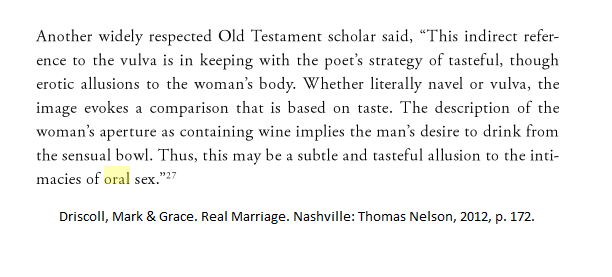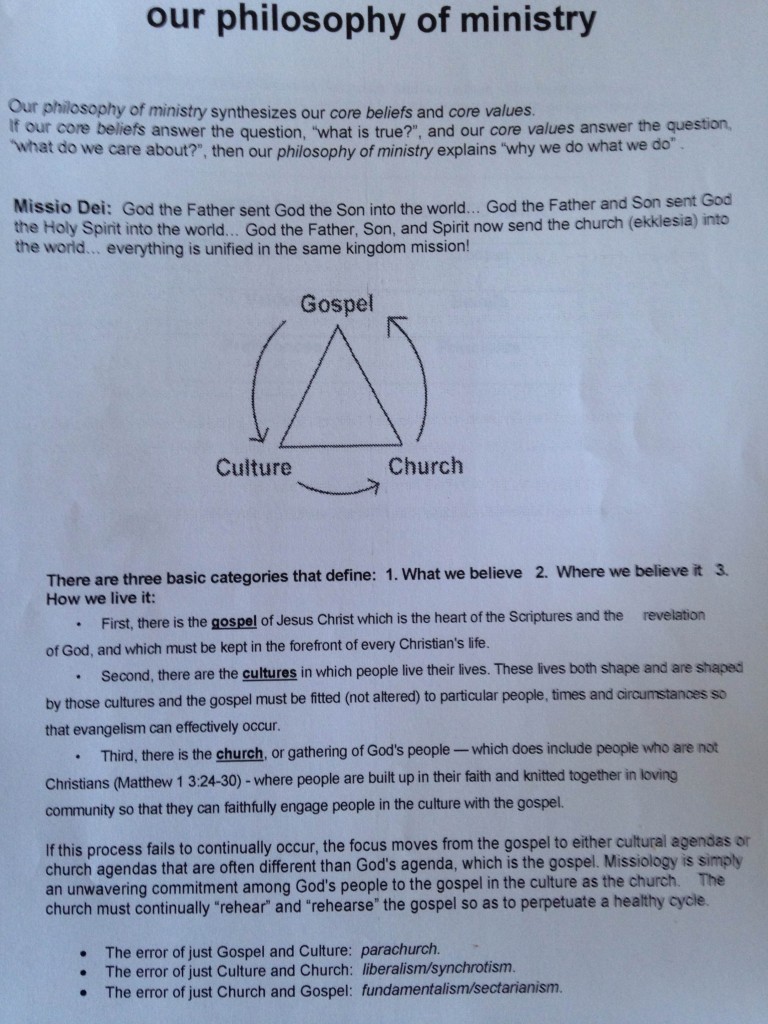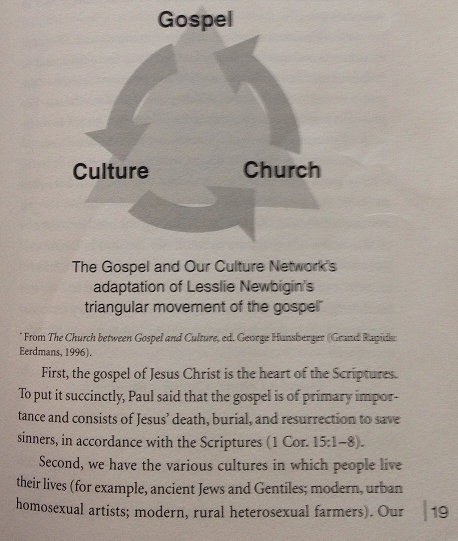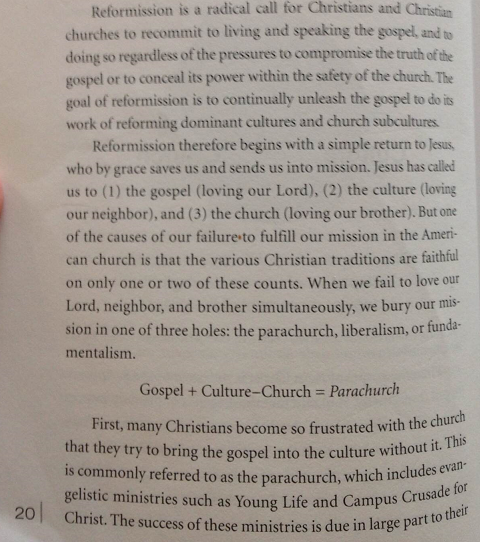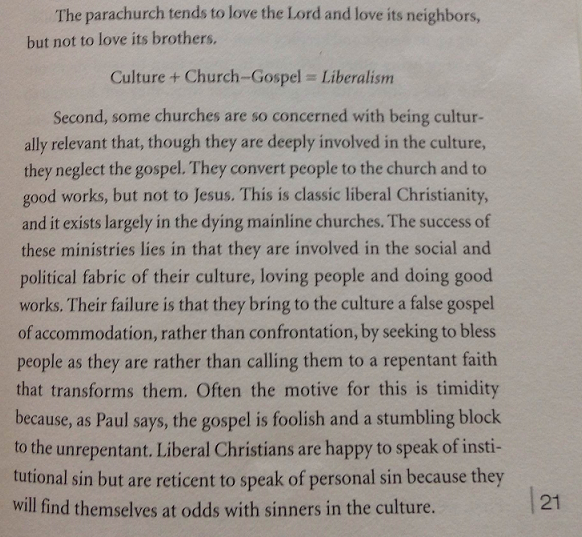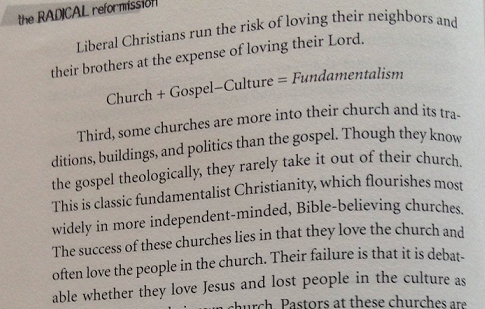While Mark Driscoll has garnered much attention regarding his citation errors (e.g., plagiarism, factual errors, inadequate citations), Driscoll’s assistant and fellow executive elder may also need to do some correcting. In chapter four of his book, Invest, Turner lists differences between a job and a ministry:
- If you want praise and recognition for what you do, it’s a job. If no one else besides Jesus needs to commend your work, it’s ministry.
- If you do the job as long as it does not cut into other things (such as hobbies, family activities, etc.), it’s a job. If you are willing to make sacrifices in your personal schedule, it’s ministry.
- If you compare your lot with others who have more free time, more money, and more possessions, it’s a job. If you pray for others rather than compete with them, it’s ministry.
- If it bothers you when the phone rings on evenings and weekends, it’s a job. If you see random calls at odd hours as opportunities to serve with joy, it’s ministry.
- If you want to quit because the work is too hard, the pressure is too great, or your performance is criticized, it’s a job. If you stick it out—until Jesus clearly tells you that it’s time to move on—it’s ministry.
- If you use the church as a stepping-stone, a payday, or a gold star on your résumé, it’s a job. If you’re working for the church because you love Jesus and you want more people to meet him, get saved, and be transformed, then it’s ministry.
- Turner, Sutton (2013-12-16). Invest: Your Gifts for His Mission (Kindle Location 673). Resurgence Publishing, Inc.. Kindle Edition.
Compare Turner’s list in his 2013 book with this list from a 1999 sermon by Mickey Anders.
Someone has said there is a huge difference between having a job at church and having a ministry at church.
… If you are doing it because no one else will, it’s a job. If you are doing it to serve the Lord, it’s a ministry.
… If you’re doing it just well enough to get by, it’s a job. If you’re doing it to the best of your ability, it’s a ministry.
… If you’ll do it only so long as it doesn’t interfere with other activities, it’s a job. If you’re committed to staying with it even when it means letting go of other things, it’s a ministry.
… It’s hard to get excited about a job. It’s almost impossible not to get excited about a ministry.
An average church is filled with people doing jobs. A great church is filled with people involved in ministry.
Dr. Mickey Anders,
Sermon: “The Beginning of Ministry,” First Christian Church, Pikeville, Kentucky January 24, 1999
There are other lists attributed to Anders and very nearly the same list also attributed to a Melody Blevins. Anders was, until recently, affiliated with the South Elkhorn Christian Church in Lexington, KY. Many lists like this are printed without attribution and often add something to Anders list (although I have no way of knowing what was in Anders original list). Take this one for instance:
Is it a Job or a Ministry?
Some people have a job in the church. Others get involved in a ministry.
What’s The Difference?
If you’re doing it because no one else will, it’s a job.
If you’re doing it to serve the Lord, it’s a ministry.
If you’ll do it so long as it doesn’t interfere with other activities it’s a job.
If you’re committed to staying with it even when it means letting go of other things, it’s a ministry.
If you quit because no one praised or thanked you, it was a job.
If you stayed with it even though no one seems to notice, it’s a ministry.
It is hard to get excited about a job.
It is almost impossible not to be excited about a ministry.
If your concern is “success”, it’s a job.
If your concern is “faithfulness”, it’s a ministry.
An average church is filled with people doing jobs.
A great church is filled with people who are involved in ministries!
The list attributed to Melody Blevins has similar points:
A JOB OR A MINISTRY – by Melody Blevins
Some people have a JOB in the church; others involve themselves in a MINISTRY. What’s the difference? If you are doing it just because no one else will, it’s a JOB. If you are doing it to serve the Lord, it’s a MINISTRY. If you quit because someone criticized you, it was a JOB. If you keep on serving, it’s a MINISTRY. If you’ll do it only so long as it does not interfere with your other activities, it’s a JOB. If you are committed to staying with it even when it means letting go of other things, it’s a MINISTRY. If you quit because no one praised you or thanked you, it is a JOB. If you stay with it even though nobody recognizes your efforts, it’s a MINISTRY. It’s hard to get excited about a JOB. It’s almost impossible not to be excited about a MINISTRY. If our concern is success, it’s a JOB. If our concern is faithfulness, it’s a MINISTRY. An average church is filled with people doing JOBS. A great and growing church is filled with people involved in MINISTRY. Where do we fit in? What about us? If God calls you to a MINISTRY, don’t treat it like a JOB. If you have a JOB, give it up and find a MINISTRY. God does not want us feeling stuck with a JOB, but excited and faithful to Him in MINISTRY.
The lists are not identical but they seem similar enough that attribution certainly would be appropriate. At least one reviewer of the book took the list to be original with Turner.
This list or construction might not be original with either Anders or Blevins, but the point is that it does not appear to be original with Turner. Various lists like this have gotten passed around the web since the early days. It didn’t take me long to find two possible authors but no one is cited in Invest. When in doubt, an author should footnote and describe where the material was discovered. An author can adapt material but this should be noted in a footnote.
I have asked Sutton Turner for comment and will report if he replies. Perhaps this is a rare coincidence. However, the Blevins/Anders lists clearly predate Invest, and unless another explanation is offered appear to be the basis for this section of Turner’s book.
UPDATE: Both Sutton Turner and Communications Director Justin Dean responded to my request for comment. Turner took the request seriously and replied that he would correct the problems identified when the book was reprinted. Justin Dean also wrote to say:
We are looking into the best way to cite this in the footnotes and will update the book upon reprint. I don’t have any other information about this right now but we will look into it and make any changes necessary.
His answer was in response to my question about the nature of the error. Did Turner use material he knew wasn’t his or was it an oversight? I am still not clear on this but I can say that it was refreshing to get a serious respectful reply.
